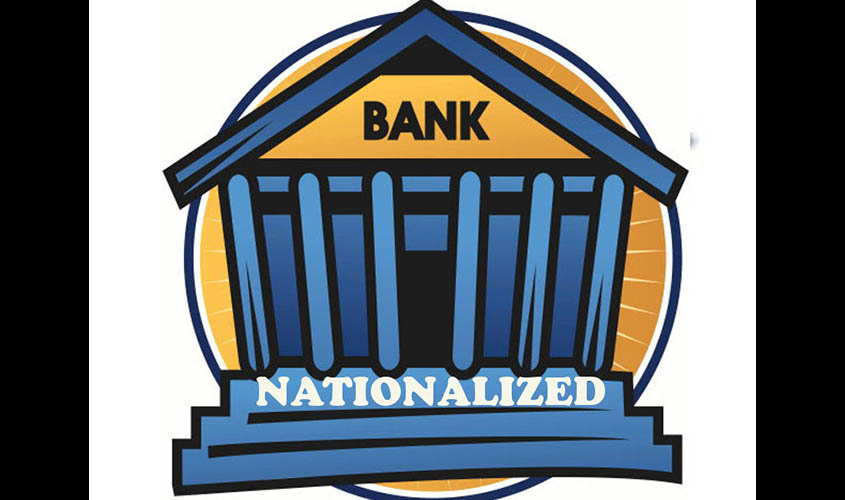On 20 July 1969, American astronaut Neil Armstrong took “one giant leap for mankind.” A day before that, Indira Gandhi had already taken another giant stride—to tighten the politician’s stranglehold over the Indian economy. This is what bank nationalisation—a policy error of astronomical proportions—did.
In the Reserve Bank of India’s estimation, it was a momentous decision: “By any measure, this was the defining economic event of not just the 1960s, but the next three decades. Its reverberations have still not died down. It remains, without doubt, the single most important economic decision taken by any government since 1947. Not even the reforms of 1991 are comparable in their consequences—political, social and, of course, economic.”
Typically, the Central bank was being bland; actually it was the single most despicable and deleterious economic decision taken by any government since 1947. Despicable because a most immoral class was economically empowered in an unprecedented manner. And deleterious because it has drained the exchequer and strained the economy to such an extent that India, despite its myriad pluses, can tap only a small fraction of its potential.
Much is made out of the progress banking has made in the last 50 years. Those who support bank nationalisation keep reminding us that there were just over 8,200 bank branches in the country of which only 22% were in rural areas, whereas now there are about 1.2 lakh branches and a majority of them are in rural areas. But then 50 years is a long period in the life of a modern nation; in the same period everything has increased in similar or even greater proportions—the gross domestic product, even the per capita income, air travel, telephones, the numbers of two- and four-wheelers, houses, etc.
As for the increased penetration of bank branches in the countryside, it has not transformed our villages. Agriculture, the main occupation, is languishing. A sector that employs half the population contributes just 17-18% to the GDP. There is nothing to suggest that rural India would have been in a worse shape without bank nationalisation.
While bank nationalisation helped nobody except politicians, it ended up subduing the world’s largest democracy
We will, however, be excessively and unreasonably harsh if we shift the entire culpability to Indira Gandhi. For while it’s true that by nationalising banks Indira Gandhi gifted enormous economic powers to her own government, every government since then has been loath to give up. The gift, one may add, was not just at the expense of the supposedly heartless bankers and ruthless capitalists; it was at the expense of millions of Indians whose tax money, lakhs of crores, has been used to keep public sector banks (PSBs) alive.
Second, she nationalised banks, but it was not a bolt from the blue; the momentum was building up; demands were made by Leftist intellectuals (Right-leaning ones didn’t exist half a century ago) and politicians for “social control” over banks, indeed over the entire economy. She was just bold and shrewd enough to read the pulse of the people and the thrust of public discourse—and use the decision to bolster her pro-poor image. She took a decision which paid her rich dividends in the next general election in 1971.
While the decision to nationalise banks was taken in 1969, demands were made earlier too. Way back in 1948, the All India Congress Committee favoured the nationalisation of banks and insurance companies. Even before Independence, there was a strong, vocal group in the grand old party that loved socialism and talked about redistribution of wealth. And it was not some fringe group; it comprised such luminaries as Jawaharlal Nehru, Subhas Chandra Bose, Jayaprakash Narain, and J.B. Kripalani.
The idea of “social control” over banks was zealously championed, and few opposed it. For instance, Pai Panandikar, an advisor to the Ministry of Finance (under the supposedly pro-capitalism Morarji Desai) had suggested in a report that “if existing banking legislation was suitably amended, the objectives of social control…could be achieved”. In short, there was nothing morally wrong with social control.
In such a climate of opinion, bank nationalisation was not regarded as evil at that time. As the prominent journalist, the late Inder Malhotra, wrote (Indian Express, 10 July 2009): “Twenty-four hours later, on a Saturday, the ordinance to nationalise 14 major banks was issued and instantly became a sensation, inviting sharp criticism from Indira Gandhi’s critics and enthusiastic support from the people at large. …in Delhi, crowds of workers, rickshaw drivers and others danced with joy on hearing the news. Almost none of them had ever darkened the door of a bank or was likely to do so in future. But all of them were happy that something was being done for the poor and the rich were being put in their place.” Bad economics continues to be good politics. The more things change, the more they remain the same.
The author is Editor, www.thehinduchronicle.com

